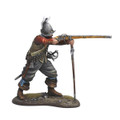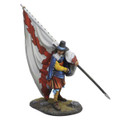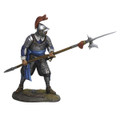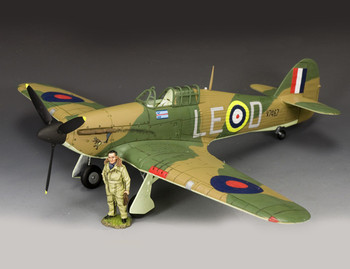 Loading... Please wait...
Loading... Please wait...Categories

New Products
-
$109.95

-
$84.95

-
$84.95

-
$119.95

-
$84.95

- Home
- KING & COUNTRY
- ROYAL AIR FORCE
- RAF093 Sqdn. Ldr. Douglas Bader's Hawker Hurricane by King and Country
- Home
- KING & COUNTRY
- RAF093 Sqdn. Ldr. Douglas Bader's Hawker Hurricane by King and Country
RAF093 Sqdn. Ldr. Douglas Bader's Hawker Hurricane by King and Country
Product Description
RAF093 ‘Sqdn. Ldr. Douglas Bader’s Hawker Hurricane’
Douglas Bader DSO & Bar, DFC & Bar (1910-1982) was a Royal Air Force flying ace during WW2. He was credited with 22 aerial victories, four ‘shared’ victories, six ‘probables’ and 11 enemy aircraft ‘damaged’.
He joined the RAF in 1928 and was commissioned in 1930. In December 1931, while attempting a low-flying aerobatic stunt he crashed his Bristol Bulldog biplane and lost the lower parts of both legs. Despite being on the brink of death he recovered and retook his flight training and passed all of his flight checks however the RAF still retired him on medical grounds.
Upon the outbreak of war in September 1939 Bader immediately reapplied to the RAF to rejoin and, after some difficulties, was accepted for operational flying duties as a fighter pilot.
He scored his first ‘victories’ while flying over Dunkirk during the Battle of France in 1940. He then took part in the Battle of Britain being promoted to Squadron Leader and put in command of No. 242 Squadron of RAF Fighter Command, a unit made up of mostly Canadian pilots.
In August 1941, Bader’s aircraft was in collision with an enemy Messerschmitt 109 and he had to bale out over occupied France and was soon captured.
It was then he met for the first time and was befriended by the prominent German air ace, Adolf Galland. After being ‘wined and dined’ by his Luftwaffe captors at their airfield he was sent to the first of several Prisoner of War camps where, despite his disability, he made a number of failed escape attempts.
Eventually he was sent to the ‘bad boys’ camp at the infamous Colditz Castle where he remained until liberation by the U.S Army in April 1945.
Douglas Bader left the RAF in early 1946 and resumed a flying career in private industry with the giant Shell BP company. During the 1950s a best-selling biography and a block-busting film, ‘REACH FOR THE SKY’ were released and were great successes.
For the rest of his life Bader campaigned for disabled people especially the young. In 1976 he was knighted by Queen ElizabethⅡ for his many years of service. He also continued to fly until ill health forced him to stop in 1979. Sir Douglas Bader passed away in 1982.o install it in either a Spitfire or a Hurricane.










